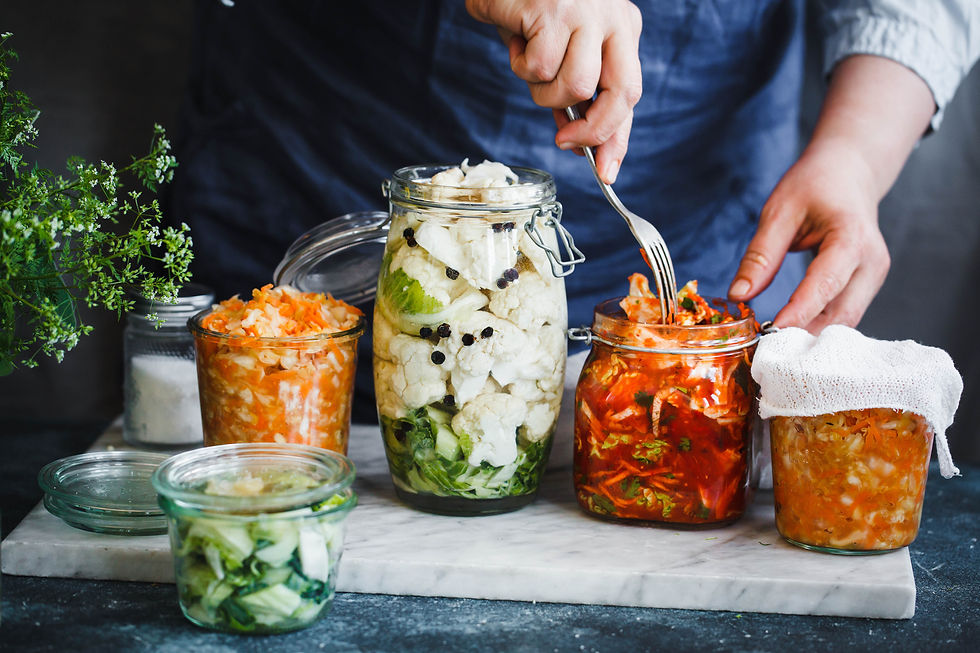Prebiotics and Gut Health: What They Are and Why You Need Them
- Helen Ross
- Jun 23, 2025
- 3 min read
Updated: Dec 7, 2025

What Are Prebiotics?
If you’re on a journey to improve your gut health, you’ve probably heard about probiotics - the live bacteria found in fermented foods like kefir, kimchi, and yoghurt. But there’s another key player in gut wellness that often gets overlooked: prebiotics.
Prebiotics are a type of non-digestible fibre that feed the beneficial bacteria in your gut. While our bodies can’t digest these fibres, our gut microbes can, and in fact, they rely on them to thrive.
Why Are Prebiotics Important for Gut Health?
Including prebiotics in your diet helps create a balanced, diverse, and resilient gut microbiome, which in turn supports many aspects of our health.
Here’s what prebiotics can do for you:
Top Benefits of Prebiotics:
Support digestion by encouraging the growth of beneficial gut bacteria.
Boost immunity by regulating inflammatory responses.
Enhance brain and mood health through the gut-brain connection.
Reduce inflammation via the production of short-chain fatty acids (SCFAs) like butyrate.
Improve nutrient absorption, especially calcium and magnesium.
By feeding your good gut bacteria, prebiotics help restore balance and strengthen your entire digestive ecosystem.
Types of Prebiotics and Where to Find Them
Not all prebiotics are the same. Different types feed different strains of beneficial bacteria.
Here’s a breakdown of the main types of prebiotic fibres and the best food sources:
1. Inulin
Found in: Chicory root, onions, garlic, leeks
Supports: Bifidobacteria growth
2. Fructooligosaccharides (FOS)
Found in: Bananas (slightly green), asparagus, Jerusalem artichokes
Helps improve: Bowel regularity and microbiome diversity
3. Galactooligosaccharides (GOS)
Found in: Lentils, chickpeas, and other legumes
Known for: Supporting immune function and gut barrier integrity
4. Resistant Starch
Found in: Cooked and cooled potatoes, green bananas, oats (better when soaked overnight), legumes
Benefits: SCFA production, especially butyrate
5. Pectins & Beta-glucans
Found in: Cooked apples, citrus fruits, oats, barley
Benefit: Slow digestion and support blood sugar balance

Prebiotic Foods to Add to Your Diet
Looking to improve your gut flora naturally? Try these easy ways to add more prebiotic-rich foods into your everyday meals:
Breakfast: Overnight oats with green banana slices and chia seeds
Lunch: Roasted vegetable frittata with garlic, leeks, and cooled new potatoes
Dinner: Lentil dhal or chickpea curry with a side of sautéed onions
Snacks: Apple slices with nut butter, or a fibre-rich smoothie with flaxseed
Please note: If you’re new to high-fibre foods or prone to bloating, start slowly. Give your gut time to adjust and drink plenty of water.
As you may have noticed, many of these foods are also high in FODMAPs. This is why it is important not to follow a low FODMAP diet for the long-term. When starting out, they must be introduced very slowly if you struggle to digest these foods.

Prebiotics vs Probiotics: What’s the Difference?
Prebiotics feed the beneficial bacteria. Probiotics are the beneficial bacteria.
In short, you need both. Think of probiotics as the seeds and prebiotics as the fertiliser. One supports the other. Without prebiotics, your probiotics won’t survive or thrive.
Support Your Gut Naturally
A healthy gut isn’t built overnight - adding prebiotic foods for gut health is a powerful and natural way to support digestion, mental clarity, energy, and immune resilience.
Whether you're struggling with bloating, irregularity, or low mood, nurturing your gut microbiome through diet is a foundational step.
Join our FLOURISH Reset Retreat at Launceston Farm, north Dorset from March 23rd - 27th, 2026 if you are interested in learning more about cooking for a healthy gut. More details here.
Need Personalised Gut Health Support?
As a Registered Nutritional Therapist, specialising in gut health, I help clients identify the root causes of digestive issues, hormone imbalances, autoimmune diseases, and other chronic health issues, and create tailored nutrition plans that help to restore balance.
Book a free 15-minute discovery call to explore how I can support your journey to better gut health.
Or download my Free Gut Health resources to get started today.
Order your copy of The Simple Gut Reset Cookbook for more gut-supporting recipes.
For more information see: www.thewelllifelab.co.uk
Facebook: https://www.facebook.com/thewelllifelab
Instagram: the_well_life_lab








Comments